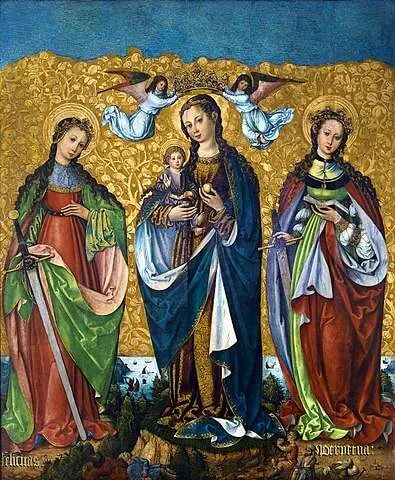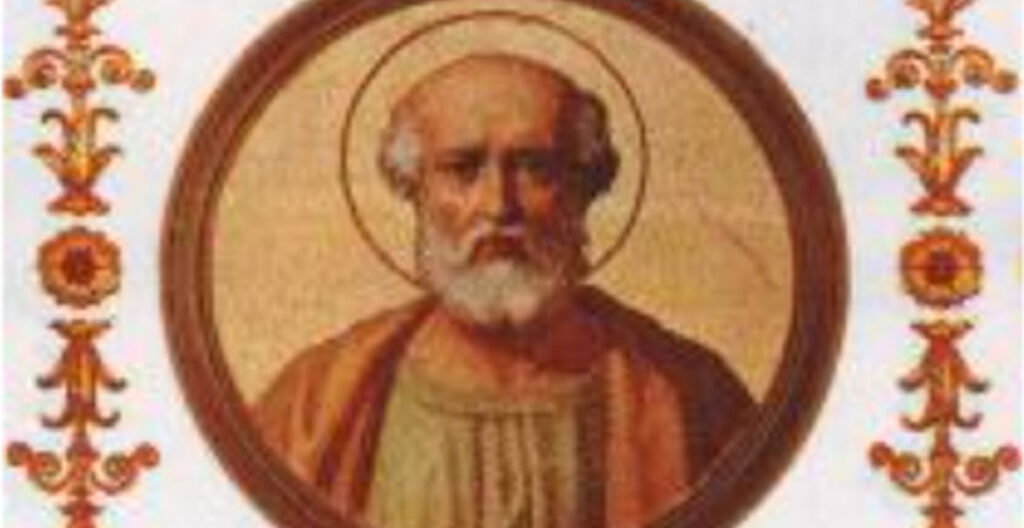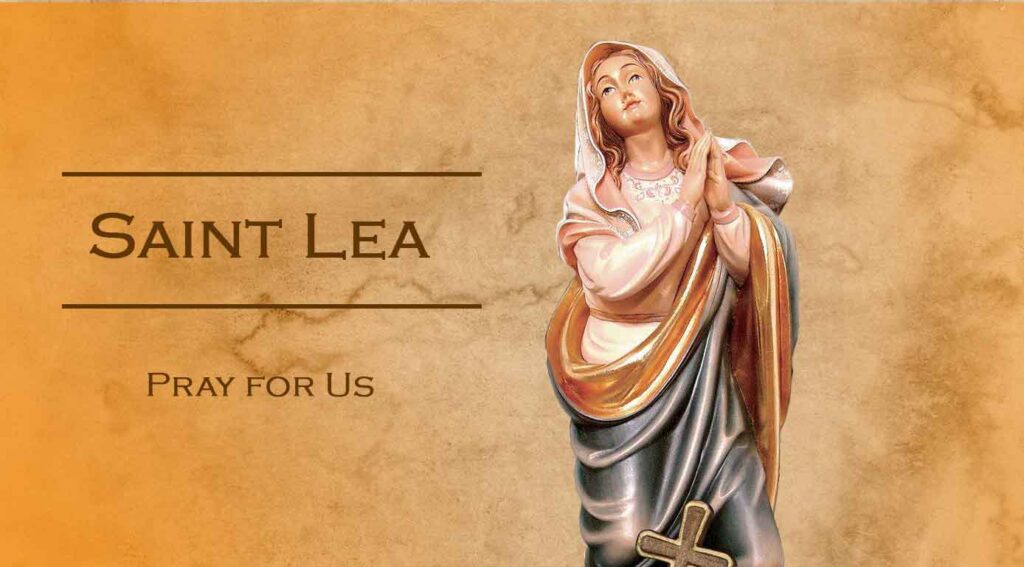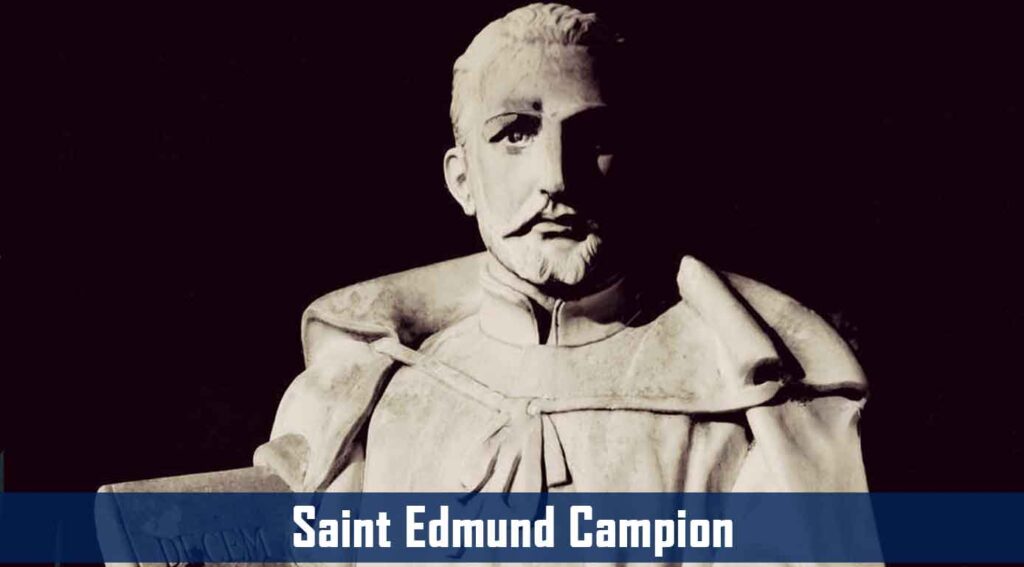Saint Perpetua: c. 182–203; Patron Saint of cattle and martyrs; Invoked against the death of children; Saint Felicity: Unknown–203; Patron Saint of martyrs; help to have male children, and widows; Invoked against sterility and the death of children; Pre-Congregation canonizations
The first records of martyrdom in North Africa took place in 180 when twelve Christians were tried and put to death for their faith. After those first martyrs, the Christian faith in North Africa grew stronger and new converts became commonplace.
In an attempt to slow the growth of Christianity, Roman Emperor Septimius Severus issued a decree forbidding subjects of the Roman Empire to convert. If they did, they were given the opportunity to renounce their faith and honor the Roman gods. If they refused, they were put to death. In 203, five catechumens preparing for baptism were arrested in the Roman city of Carthage (modern-day Tunisia). Among those catechumens were the two martyrs we honor today.
Vibia Perpetua was a twenty-two-year-old married noblewoman at the time of her arrest. She was also a mother, having recently given birth to a son whom she was still nursing. Her father was a pagan, but her mother and a brother were baptized Christians. A second brother was preparing for baptism alongside Perpetua, and a third brother had already died as a pagan.
Perpetua had been touched by Christ and decided to become a Christian, but she was arrested before her baptism. Her pagan father came to her in prison and pleaded with her to renounce the Christian faith and refuse baptism to save her life so she could raise her son.
Perpetua records that conversation as follows: “‘Father, do you see this vessel lying here to be a little pitcher, or something else? Can it be called by any other name than what it is?’ And he said, ‘No.’ ‘Neither can I call myself anything else than what I am, a Christian’” (Passion of Saints Perpetua and Felicity). A few days later, Perpetua was secretly baptized in prison.
While in prison, Perpetua’s heart yearned for her baby. To her joy, the infant was brought to her so she could nurse him. When that happened, she said, “My prison suddenly became a palace to me and I would rather have been there than anywhere else.”
Felicity, a slave, was also a young woman and pregnant at the time of her arrest. One eyewitness stated, “Felicity had feared that she might not be allowed to suffer with the rest, because pregnant women were not sent into the arena. However, she gave birth in the prison to a daughter whom one of their fellow Christians at once adopted.”
When these brave women stood before their judge, Perpetua’s father showed up with her baby, pleading with her to renounce Christ, save her life, and be there for her son. The judge also encouraged her: “Spare your father’s white hairs. Spare the tender years of your child. Offer sacrifice for the prosperity of the emperors.” Perpetua refused. When asked directly if she were a Christian, she responded, “Yes, I am.”
At that, her father violently inserted himself into the situation but was struck by the guard. When Perpetua saw this, her heart broke. She later recounted, “I felt this as if I myself had been struck, so deeply did I grieve to see my father treated thus in his old age.” The judge passed sentence and all were condemned to death by wild beasts. Still, they were filled with great joy as they returned to their prison. After the sentencing, Perpetua was no longer allowed to see her baby boy.
On the day of their martyrdom, Perpetua and Felicity walked to the arena with heads high and joyful spirits. With them were Revocatus, a fellow slave with Felicity, and two freemen, Saturninus and Secundulus. The men were sent into the arena first to be devoured by a leopard, a wild boar, and a bear. Saturnius was the last standing. When a second leopard attacked and blood poured out, the crowd cried out, “He is well baptized now!”
Perpetua and Felicity were then placed in the arena, and a wild cow was let loose as a way of mocking them as nursing mothers. The beast gravely wounded them but did not kill them, so an executioner was dispatched. Perpetua cried out to her brother, “Stand fast in the faith, and love one another. Do not let our sufferings be a stumbling block to you.” She then noticed the fear in the eyes of the executioner so she guided his sword to her neck and the young women received their eternal reward.
Perpetua and Felicity were both new young mothers at the time of their martyrdom. They loved their newborn babies with tender love. But they also loved their God Whom they had both recently come to know. They were forced to choose. Either reject Christ and be there to raise their babies or remain Christian and leave their babies.
With heroic courage and faith, they remained true to both. They remained faithful to Christ, dying as martyrs, and they fulfilled their greatest motherly duty by giving heroic witnesses of faith to their babies. We can only hope that as their children grew and were told the stories of their mothers’ love of God, those children were inspired and sought to imitate their mothers’ Christian faith.
Place yourself in that same situation. Would you have had the courage to face death? Would you be able to stay true to your profession of faith under such extreme emotional and familial pressures? Pray to these saintly mothers and be reminded that the greatest gift we can pass onto others is the witness of our faith in Christ. Life is empty unless Christ is loved and professed, and death loses its sting when our lives are Christ’s.
Source: https://mycatholic.life/saints/saints-of-the-liturgical-year/march-7-saints-perpetua-and-felicity-martyrs/







